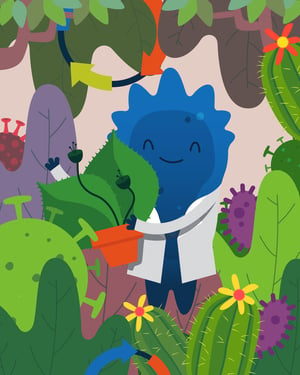 This is the last post in a blog series on sustainable practices in the lab, where I’ll list some easy but effective habits you can incorporate to reduce your lab consumption and increase your lab sustainability. For my other posts on lab sustainability, check out my Recycling and Innovations posts.
This is the last post in a blog series on sustainable practices in the lab, where I’ll list some easy but effective habits you can incorporate to reduce your lab consumption and increase your lab sustainability. For my other posts on lab sustainability, check out my Recycling and Innovations posts.
Making small changes in your daily habits can feel ineffective or unimportant. With so many big contributors to the sustainability problem, how can one little change make a difference? Individual changes to our behavior can lead to cultural shifts that can have bigger impacts. For example, if you joined an office where everyone used a mug or reusable water bottle, you’d probably bring in a mug or reusable water bottle instead of buying yourself a big stack of plastic cups. By initiating little changes in ourselves, we can both influence others to change their behavior and we become more aware of our own consumption.
Quick ways to reduce energy consumption in the lab
Here are a few easy and fast things you can start doing right away to reduce your consumption in the lab:
- Turn off your equipment at the end of the day and when not in use. You wouldn’t leave your oven on all day to save time making dinner at night, so why leave your lab equipment on? This applies to water baths, computers, and more.
- Consolidate your autoclave runs. In one of my previous labs, we had a communal tray that everyone could add to, and then the whole thing would get autoclaved together. The autoclave uses a lot of energy, so even one less run a week makes a big difference.
- Clean out freezers so you can make room and don’t have to keep buying more freezers. I am pretty sure that the world will go on without my whole-cell extract from 2009.
- Join a newsletter to stay up-to-date on all the latest news and encourage your peers to do the same.
Long-term lab conservation goals
Lastly, I think it’s a good balance to have both short-term and long-term goals to stay motivated and to feel accomplished. In addition to doing some of the quick things above, try joining or starting a sustainability project.
This could be:
- Setting up a recycling program at your institute.
- Set your -80 °C freezer to -70 °C and teach other labs to do the same. -70 °C is cold enough to keep some common types of reagents stable for years. In fact, some scientists speculate the -80 °C setting might have been a marketing campaign! MIT Green Labs has a lot of resources about this, and even has a list of biological samples that are stored long term at -70 °C. My Green Lab also has resources and even a freezer challenge that your university could join.
- Find alternatives for some of the harmful chemicals in your lab. These chemicals are not only better for the environment, but most likely safer for researchers, as well.
Additional resources on the Addgene blog
- Learn about recycling initiatives for the lab
- Subscribe to the Addgene blog
- Learn about other creative approaches for lab sustainability
Resources on Addgene.org
- Sign up for our quarterly newsletter
- Help other scientists save resources by sharing plasmids
- Find plasmids at Addgene
Topics: Addgene News





Leave a Comment